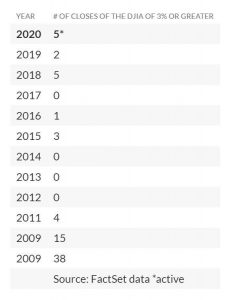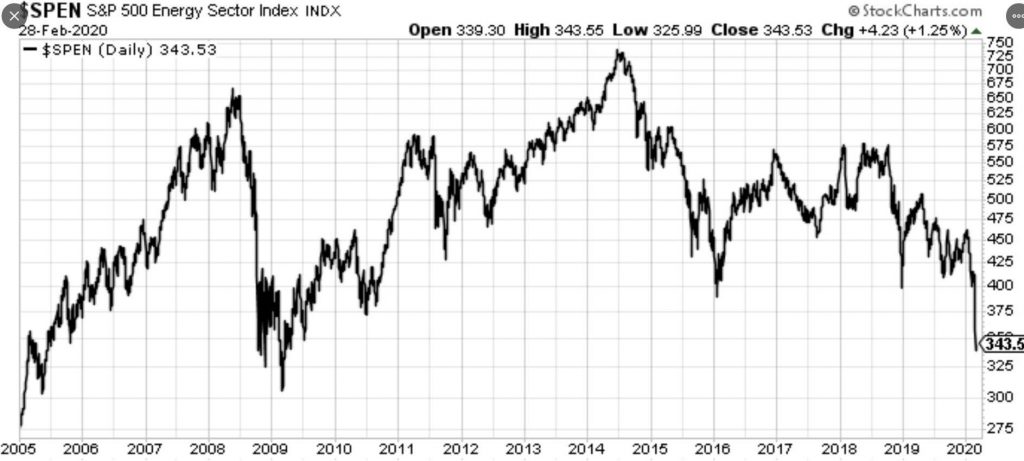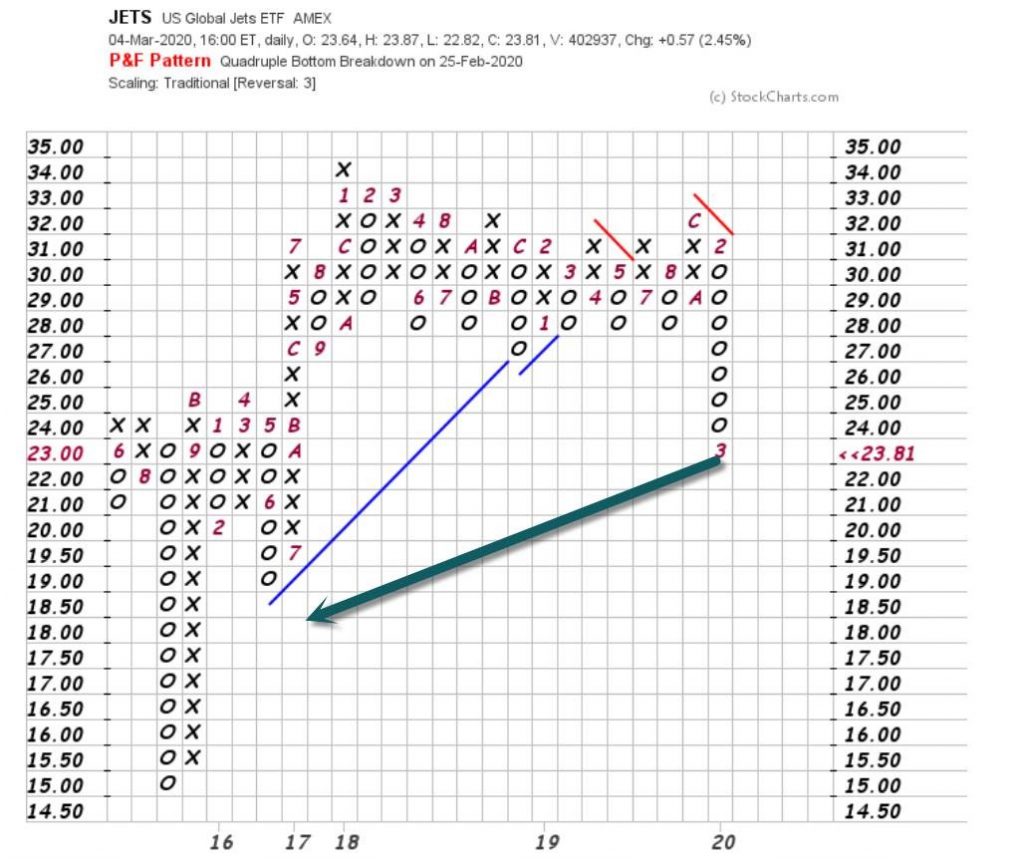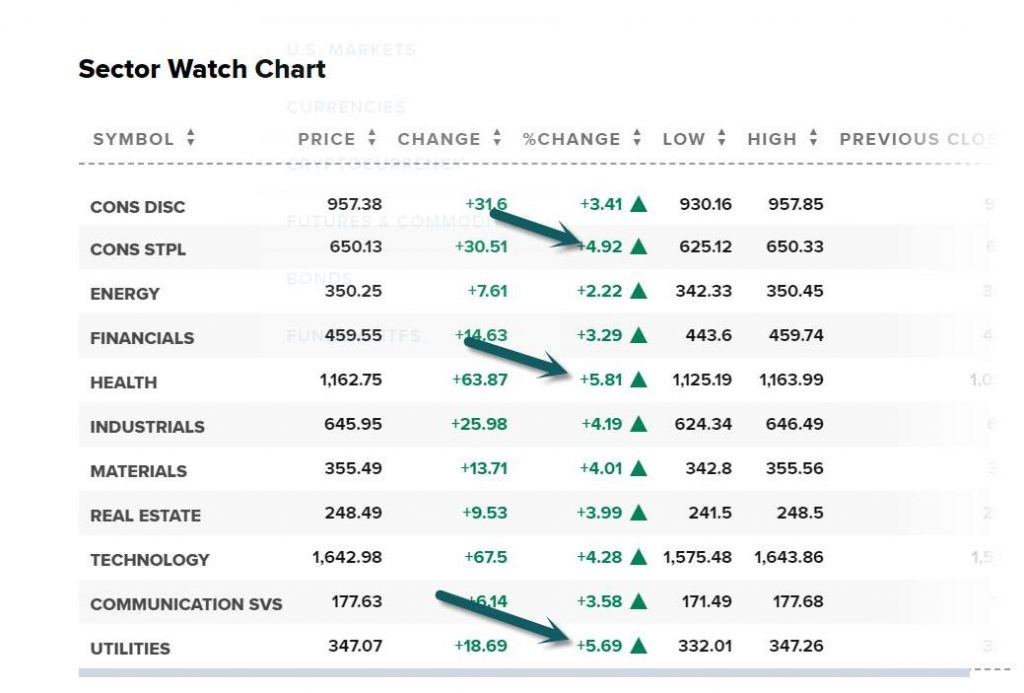1.Number of 3% Moves Already in 2019.

2.7 Day Volatility Highest Since 2011

How volatile is the coronavirus-stricken stock market? After the worst week since 2008, the Dow is now on pace for its best week since 2011
By Mark DeCambre https://www.marketwatch.com/story/how-volatile-is-the-coronavirus-stricken-stock-market-after-the-worst-week-since-2008-the-dow-is-now-on-pace-for-its-best-week-since-2011-2020-03-04?mod=home-page
3.Clear Picture of the Market’s Thoughts on Clean Energy vs. Fossil Fuels.
Clean Energy ETF Right Below Tech in Leadership vs. Fossil Fuels Worst Performing Sector

InvestmentU-Fossil Fuels Are Out, Renewables Are In–By David Fessler
4.The S&P Energy Index is Lower Than 15 Years Ago.

Howard Lindzon
5.Re-Visit Airline ETF
Airlines marked down again this morning….Still well above 2015-2016 levels.

Airlines could lose up to $113 billion in passenger revenue due to coronavirus, IATA says
CNBC

https://www.cnbc.com/2020/03/05/coronavirus-iata-warns-passenger-revenue-could-fall.html
6.Defensive Sectors Led Yesterday….Healthcare Big Biden Boost.

7.Regional Bank Index…10 Year Breaks 1% Not Good For Net Interest Margins
KRE-Regional Bank ETF—Holding Above 2019 Lows

8.Better Off Financially Americans Hits High from 1999
6 in 10 Americans say they’re better off financially than they were a year ago. This is an all-time high in the poll and at levels we last saw in 1999 during the tech boom. Worries about the economy are also at all-time lows.

American Living Standards Have Never Been Better-Cullen Roche – 02/10/2020
9.Who Sells When the Market Falls?
Posted February 27, 2020 by Michael Batnick
There is this commonly held belief that mom and pop investors panic when the market is going down. Turns out this might not be the case after all.
Jason Zweig did some excellent debunking yesterday on this topic in the Wall Street Journal:
“Institutions sell more than individuals when there is a large stock-market drop,” finance professors Patrick Dennis and Deon Strickland found in a 2002 study. They also showed that the more widely a stock is held by big investors, the greater its trading volume during sharp market drops.
In order to find out how investors behave, he turned to data from the epicenter of retail, Vanguard.
A survey of more than 16,000 individual investors by Vanguard Group, the giant asset manager, shows how drastically their attitudes differ from those of big institutions. Vanguard has been repeating this survey every two months since early 2017. The results suggest that individual investors have become a major force for moderation in the financial markets.
How about them apples!
But we know better than to trust surveys, and luckily, there is some fresh data to back up this claim.
Eric Balchunas tweeted “$VOO took in over $1b, while Vanguard as a whole took in over $3b, during the worst two-day decline in the market since 2008, with 57 of their ETFs have taking in cash in past week. Even by Vanguard standards, that’s some impressive Navy Seals-level discipline.”
It’s unlikely that mom and pop are going to crash the market, if anything, they might be helping to prevent that from happening.
9.Study: A Session In The Sauna Works Out The Heart Just As Much As Exercise
HALLE, Germany — Many fitness centers offer saunas to their clients, and they’re a great way to get an extra shvitz after a workout. It turns out that a sauna session is also a great way to get the heart pumping a little extra, too, according to new research.
A study conducted by researchers at Martin Luther University Halle-Wittenberg in collaboration with researchers at the Medical Center Berlin shows that a short sauna session causes an increase in heart rate and blood pressure that’s comparable to the increase seen from a brief, moderate intensity workout.
It’s long been assumed that a sauna session causes a steady decrease in blood pressure, but researchers say their work proves otherwise. “It was thought that the heat dilates the blood vessels and that this lowers the blood pressure”, says Dr Sascha Ketelhut, lead author of the study and a sports scientist at Martin Luther University, in a university release.
For the study, researchers measured the heart rate and blood pressure of 19 participants during a 25-minute sauna session and during a 30-minute period after the session. The next day participants completed a short workout on an exercise bike while their heart rate and blood pressure were measured.
A baseline heart rate and blood pressure reading were taken before the sauna session began. At the start of the sauna session the heart rate and blood pressure of participants rose significantly. During the 30-minute period after the session, they both dropped to values significantly lower than their baseline values.
This shows that a sauna session can be quite demanding on the cardiovascular system. This effect is even more pronounced when the heart rate and blood pressure readings from the sauna session are compared with the readings from the exercise session.
“Comparing the two conditions, the participants’ blood pressure and heart rate reached the same levels during the sauna session as they did with a load of about 100 watts during the exercise test”, says Ketelhut.
The findings of this study fall in line with the results of previous studies that show that long-term sauna use has a positive effect on one’s heart health.
Ketelhut notes that even though a sauna session places a physical strain on the body similar to sports activities, the sweating of a sauna session does not contribute to healthy weight loss. “The effect is too low as there is no muscle activity. Although we lose weight in the sauna, but these are just the fluids that we sweat out. One should rehydrate after a sauna session, though”, concludes Ketelhut.
The study is published in Complementary Therapies in Medicine.
10.Why Your Doctor Is Not Panicking About Novel Coronavirus
COVID-19 is new, but there is a lot we already know.
Each day more cases of novel coronavirus, COVID-19, are reported in the U.S., and each day we feel more anxious. With the volume of information and the confusion about what’s true, it’s easy to panic. But your doctor isn’t panicking, and you don’t need to, either.
We know more about COVID-19 than you think.
The way this epidemic is being reported highlights a sense of the unknown, and the unknown makes us anxious. It’s hard to stay calm when the director of the WHO is saying, “This is a unique virus, with unique features. This virus is not influenza. We are in uncharted territory.”
He’s right about that, and it’s alarming that the mortality statistics are looking higher than we initially hoped.
The executive director of WHO’s health emergencies program, Dr. Mike Ryan, has said, “Here we have a disease for which we have no vaccine, no treatment, we don’t fully understand transmission, we don’t fully understand case mortality, but what we have been genuinely heartened by is that unlike influenza, where countries have fought back, where they’ve put in place strong measures, we’ve remarkably seen that the virus is suppressed.”
So while we have hope that we can suppress the virus, there is still a lot we don’t know. But there is also a lot we do know. COVID-19 is a new virus in a well-known class of viruses. The coronaviruses are cold viruses. I’ve treated countless patients with coronaviruses over the years. In fact, we’ve been able to test for them on our respiratory panels for the entirety of my career.
We know how cold viruses work: They cause runny noses, sneezing, cough, and fever, and make us feel tired and achy. For almost all of us, they run their course without medication. And in the vulnerable, they can trigger a more severe illness like asthma or pneumonia.
Yes, this virus is different and worse than other coronaviruses, but it still looks very familiar. We know more about it than we don’t know.
Doctors know what to do.
Doctors know what to do with respiratory viruses. As a pediatrician, I take care of patients with hundreds of different viruses that behave similarly to this one. We take care of the kids at home and see them if the fever is prolonged, if they get dehydrated, or if they develop breathing difficulty. Then we treat those problems and support the child until they get better.
You know what to do.
You know what to do to avoid getting a cold: Wash your hands with soap and water for 20 seconds. Or rub vigorously with hand sanitizer when soap and water are not available. Cough into your elbow with a nice seal against your face. Don’t touch your face or your eyes and spread germs you may have touched with your hands.
You know how to take care of yourself when you have a cold: Drink lots of fluids and get some rest. Be kind to people who have medical problems. Just like if you have influenza, stay home and don’t spread it around.
And you know when to call your doctor. Based on your own health history, call your doctor’s office with concerns.
article continues after advertisement
The kids are okay.
For parents, it’s crucial to know that kids are doing very well in this epidemic. In general, COVID-19 has been a mild illness in children. In other words, it’s a cold. Cases of more severe disease in children with this virus appear to be very rare based on the information we have now. The main issue is the way they could spread it to other people who are at higher risk. As always, call your child’s doctor if you are concerned that you are seeing serious symptoms in your child.
They are working on a vaccine.
Smart people are working on a vaccine for COVID-19. According to the CEO of Regeneron, their vaccine will likely be in testing by this summer.
Quarantines are slowing it down.
Our health departments and the CDC are on it. As we test and isolate patients with COVID-19, so far community spread has been kept to a slow rate. This is important because it keeps our hospitals ready to meet the needs of those who do become very ill.
Employers and schools are considering their plans if an outbreak develops in their area. Many are looking at work-at-home and learn-at-home options. The health departments in each state are actively at work.
It’s scary to think that an invisible enemy is out there to make you sick. But your doctor is not panicking, and you don’t need to, either.